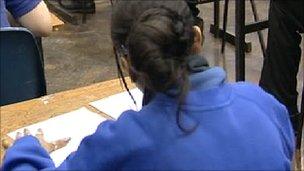Exams: Ofqual reports GCSE and A-level regrades rise
- Published

Hundreds of thousands of teenagers are taking public exams
More than 38,000 exam entries in England, Wales and Northern Ireland were regraded after schools asked for re-marks, the exams watchdog Ofqual says.
Overall, there was a 19% rise in requests for re-marks for this year's A-level, GCSE and AS-level exams.
Ofqual says the numbers were affected by a rise in GCSE exam units.
But A-levels were not changed in this time and requests for checks for these also rose - to about 80,000.
Of these, more than 12,000 were eventually given a new grade.
Ofqual says across all the exams, about one in five requests for re-marks led to a new grade being given and that was similar to last year.
More than 200,000 papers were submitted for re-marking in total.
Competition for university
Competition for university places this year was intense, with tuition fees set to rise for many students in the UK.
With a grade sometimes determining whether or not a student got the university place they wanted, there was a big increase in the numbers asking for A-level re-marks.
Just under 19,000 A-level papers were sent back for what is called a "high priority re-mark" - an increase of 29% on last year - as teenagers waited to confirm their university or college places.
Of these, just under 2,700 led to a new overall grade being awarded.
Other re-marks and checks brought the total number of queries over A-levels to about 80,000.
There were about a dozen errors in this year's exam papers taken by pupils in England, Wales and Northern Ireland, ranging from questions which were impossible to answer to printing errors.
But Ofqual said these mistakes would not have contributed to the rise in queries because measures were put in place to deal with them before the results were published.
More exam units
Ofqual says the regrading figures should be seen in context: in 2011, there were more than 18 million entries for exam and assessment units.
The numbers have risen dramatically in recent years because of changes in GCSEs, and the increase will be reflected in the number of requests for re-marks, the watchdog says.
The proportion of exam entries given a new grade as a result of a re-mark is less than 0.5% of the total entries, it says.
GCSEs have become increasingly modular in recent years - with many being taken in chunks throughout the year.
But that is going to be reversed under changes being brought in by the Education Secretary Michael Gove.
He says most exams should be taken at the end of a two-year course to make them more rigorous. The changes will affect pupils beginning GCSE courses next September.
Jim Sinclair, director of the Joint Council for Qualifications, which represents exam boards, said: "Awarding bodies are committed to providing an examination system that is accurate and provides candidates with the grades they deserve.
"Although the slight increase in the number of grade changes this year is disappointing, when looking at the scale of the system... the figures remain relatively small."
He added: "As the regulator's report highlights, there are several external factors that may have impacted on the rise in enquiries this year."
- Published7 October 2011
- Published9 June 2011
- Published8 June 2011
- Published6 June 2011
- Published2 June 2011